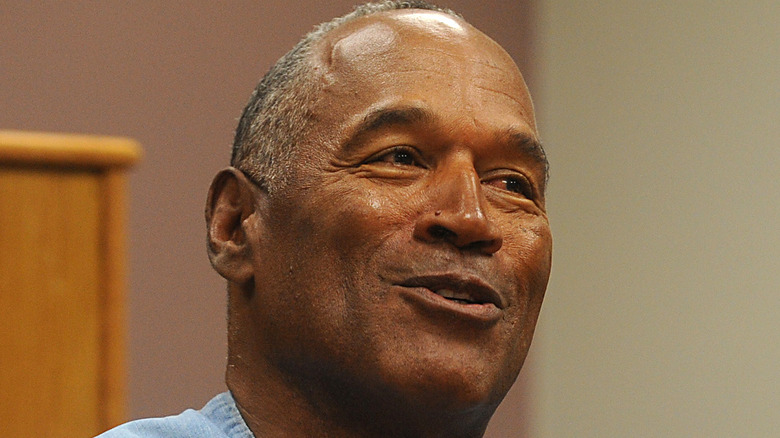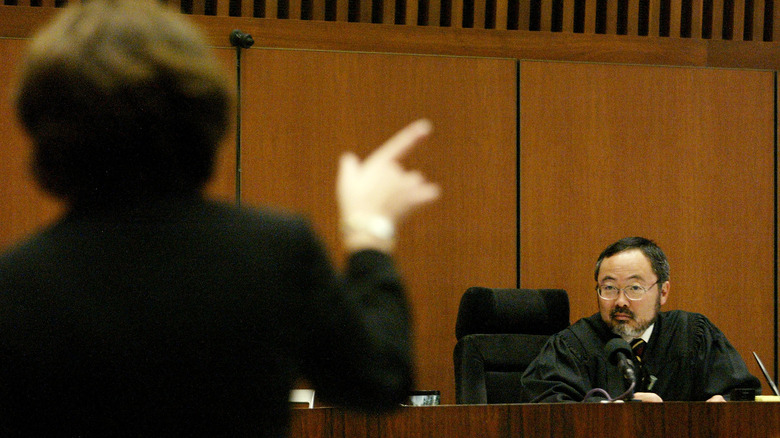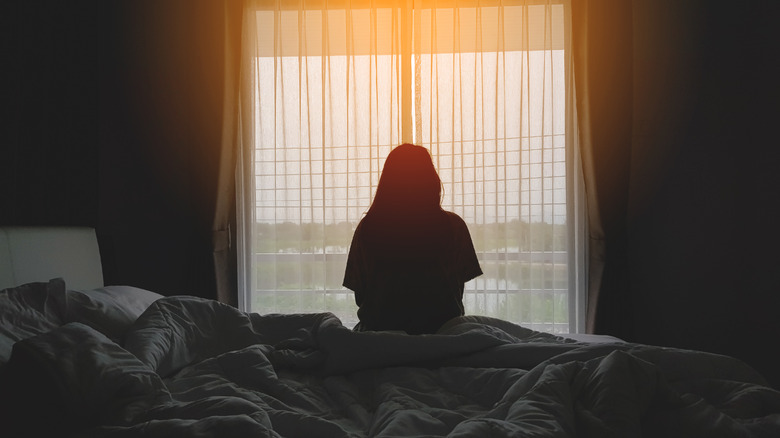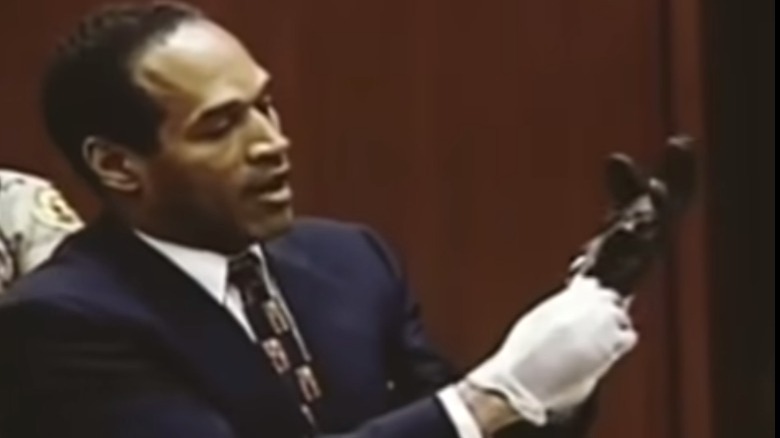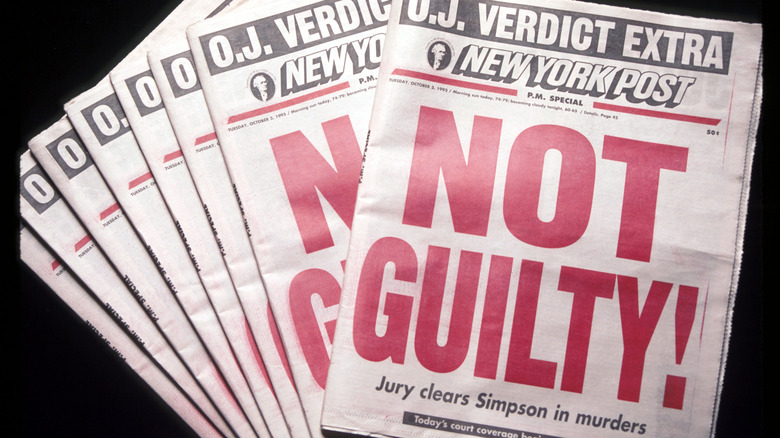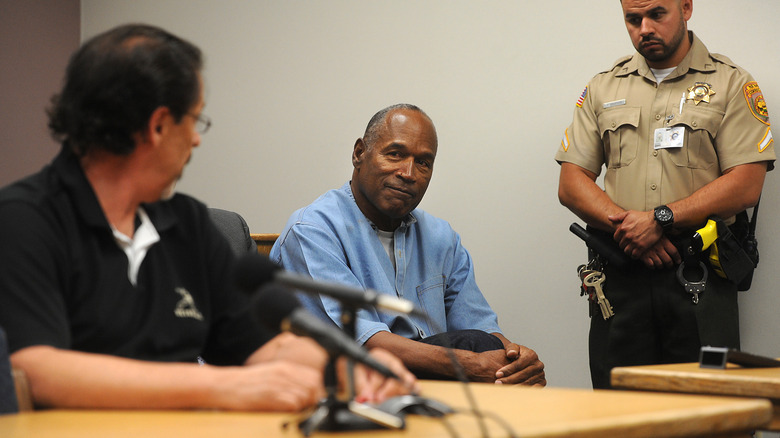What It Was Like Serving On The O.J. Simpson Jury
More than 25 years on, "The People of the State of California v. Orenthal James Simpson" — known to this day as the "trial of the century" — still has the power to captivate.
In June 1994, former-star-football-player-turned-actor O.J. Simpson was charged with the double murder of his ex-wife, Nicole Brown, and her friend Ronald Goldman, whose bodies were discovered outside Brown's home in Brentwood, California.
Shortly before Simpson's acquittal in October 1995, commentators described the "racial gap" that seemed to account for how Americans reacted to the trial: after nearly nine months of coverage, Black Americans were far more likely to believe Simpson was innocent, while white respondents overwhelmingly convinced of his guilt (via The Spokesman). As vividly recounted in ESPN's Academy-Award-winning documentary series "O.J.: Made In America," the trial took place in an era in which the U.S. was facing some tough questions about its attitudes to race and equality, in the aftermath of the beating of Rodney King by police officers and rising racial tensions. While the gap has closed in recent years, the case remains highly divisive.
Many of the trial's principal figures, including the prosecution and defense teams, the judge, and, of course, the defendant, have remained lodged in the American psyche years later. But what of the jury, whose ultimate decision made the trial one of the most notorious in U.S. history? Here's their side of the story.
The extensive selection process of the O.J. Simpson jury
The University of Missouri-Kansas City School of Law outlines just how rigorous the jury selection process for the O.J. Simpson murder trial was. Judge Lance Ito (pictured) — who rose to international fame presiding over the case — and members of both the prosecution and defense teams began the process on September 24, 1994, in a courtroom in Los Angeles where the prosecution had chosen to file the case.
In total, 250 individuals were invited to potentially take one of the 12 seats (plus the required number of alternates) on the O.J. Simpson murder trial. The case had already gained international coverage as a result of Simpson's celebrity and the horrific nature of the crimes, but also because of a dramatic low-speed car chase that had preceded Simpson's arrest, and which is believed to have been watched up 95 million people (via CNN). Both the prosecution and defense teams were tasked with formulating questions through which to identify and discount potential jurors with personal biases that might affect the outcome of the case. But with the celebrity of the defendant and the already extensive coverage of the case in the mainstream media, these questions ran into their hundreds, with jurors spending hours penning their responses. The process took more than two months.
The jury was kept in isolation
Just as the prominence of the case led to an unusually extensive and grueling jury selection process, the murders of Nicole Brown and Ronald Goldman (and O.J. Simpson's subsequent arrest) garnered so much coverage in the mainstream media meant that the jury was sequestered — effectively isolated from the outside world — until the trial concluded.
From the start of the trial in January 1995 until the jury delivered its verdict on October 3 of the same year, jurors were required to isolate in a nearby hotel for 265 days — still the longest period of sequestration in U.S. legal history by a full two months — during which time they were forbidden from using the hotel rooms' TVs or telephones, nor could they read newspapers or contemporary magazines, according to ABC News. If they wanted to leave at any time, protocol meant they needed a member of security to act as a chaperone.
"There were times where it really did feel like you were in jail. It wasn't fun at all," said juror Lon Cryer, per the same source. "I believe it created a certain tension because, of course, it created stress for people."
According to The New York Times, members of the jury reported bouts of headaches and weight gain as a result of their long months of isolation.
O.J.'s defense, doubt, and "the glove"
The jury in the O.J. Simpson case wasn't dealing with typical lawyers; as one of the biggest cases in U.S. history took form, it became increasingly obvious that some of the country's greatest legal talent was being lined up for an all-star defense team that had the skill to sow seeds of doubt among even the most compelling evidence. "O.J. had money to spend and a willingness to spend it on his own defense," said Carl Douglas, as member of Simpson's defense team, per The Atlantic. "This was a first for me."
The most famous lawyer for the defense was Johnnie Cochran, whose mantra "if the glove doesn't fit, you must acquit" scored a victory against the prosecution, who were lured into asking Simpson to try the glove on. "It might be the way [Simpson] manipulated his hands, I don't know," said juror Yolanda Crawford (via Entertainment Weekly). "But I looked at [prosecutor] Christopher Darden, and I was like, I can't believe you fell for it. And at that point, I'm like, what can you do? It didn't appear to fit."
"Based off the evidence as presented in the trial ... the only conclusion I can come to is not guilty," said Lon Cryer, per ABC News. "It wasn't based on whether or not I really thought he did it or didn't do it ... the only thing that trial did was raise reasonable doubt in my mind."
The jurors reached their decision quickly
After being sequestered throughout a sensational trial that lasted an extraordinarily long time, the jury took just four hours to reach a decision in the case of "The People of the State of California v. Orenthal James Simpson," according to History. On October 3, 1995, Simpson was declared "not guilty" on both charges, with the result heard by an estimated 140 million Americans in real-time.
In the days that followed, the media was awash with appearances by the jurors who had been forced to hold their tongues for so long. Especially prominent was Brenda Moran, who told the press: "I'm happy. I can sleep tonight ... I know we made the right decision, and we did weigh the evidence." (via CNN). As noted by The Guardian, it was the defense team's success in questioning both the validity of DNA evidence and the procedures of the police throughout the investigation — as well as the aforementioned glove incident — that was widely reported as being key to the jury's decision to acquit.
However, even as Simpson was cleared of all charges, many jurors were clear that his acquittal was the result of reasonable doubt, rather than conclusive innocence. As the daughter of juror Anise Aschenback told CNN, the jury felt "there wasn't enough evidence."
Does the jury in the O.J. Simpson case still think they were right?
Much that came to pass after the acquittal of O.J. Simpson in October 1995 would come to change the jury's view of the decision they came to after almost nine months of evidence, testimony, deliberation, and doubt. As they had been sequestered, it has been argued that the jury was not aware that the majority of Americans believed that Simpson was guilty.
Juror Lon Cryer has described how the night of the acquittal he stayed at a hotel, and subsequently received threats outside his home, according to ABC News, which also reports how Cryer's attitude towards Simpson changed around 2007, with the news that the disgraced star had written a book, titled "If I Did It" which Famous Trials describes as a "quasi-confession." "I thought [the book] was so bush league," he said. "It became apparent to me in my mind that he was probably the person that went over there and killed those people."
In October 2008, Simpson was found guilty of kidnapping, armed robbery, and assault with a deadly weapon (via The Guardian). By 2015, polls demonstrated that the "racial gap" of 1995 no longer existed and that most Black Americans now also believed Simpson was responsible for the murders (per FiveThirtyEight). Simpson was paroled in 2017.
